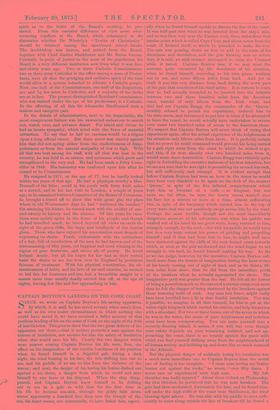CAPTAIN BOYTON'S LANDING ON THE CORK COAST.
INCE we wrote on Captain Boyton's life-saving apparatus, 0 by which, it is said, he has saved seventy other men's lives, as well as his own under circumstances in which nothing else 'could have saved it, we have received a fuller account of that perilous landing of his on the coast of Cork on the night of the 20th of last October. This goes to show that the two great defects of the apparatus are these,—that it neither protects a man against the terrors of insulation, nor secures for him the safety of insulation -when that would save his life. Clearly the two dangers which were nearest costing Captain Boyton his life were, first, the effect on his imagination of the terrible loneliness of his position when he found himself in a frightful gale during a dark -night, the wind beating in his face, the tide drifting him out to sea, and his paddle of no use to him from the violence of the -waves ; and next, the danger of his having his brains dashed out against a lee shore, a danger from which he could not save himself by any force at his disposal. When the ship disap- peared, and Captain Boyton knew himself to be drifting -out to sea in a gale so wild that for the first time in his life he became sea-sick, through the giddy falls down waves apparently a hundred feet deep into the trough' of the sea, his heart seems, not unnaturally, to have failed him, especi-
ally when he found himself unable to discern the line of the coast. It was half-past nine when he was lowered from the ship's side, and he was then very near the Fastnet rock, three miles from that insular point which is called Cape Clear, and about seven from the coast of Ireland itself, to which he intended to make his way. The rain was pouring down on him to add to the sense of his dreariness and desolation, and the gale blowing was so severe that, it is said, no mail steamer attempted to cross the Channel while it lasted. Captain Boyton was, if we may trust the account, quite overawed by the desolation of his situation, when he found himself, according to his own guess, washing out to sea, and some fifteen miles from land. And yet in truth it was this very distance from land during the worst part of the gale that constituted his chief safety. It is curious to learn that he had actually intended to be lowered into the Atlantic between two and three hundred miles from the American coast, instead of only fifteen from the Irish coast, and that had not Captain Bragg, the commander of the Queen,' steadily refused to permit the experiment, ordered him to his state-room, and threatened to put him in irons if he attempted to leave the vessel, be would actually have undertaken to return over some two hundred miles of ocean to the American shore. We suspect that Captain Boyton will never think of trying that experiment again, after his actual experience of the helplessness of his situation only fifteen miles from shore. It is perfectly certain that no power he could command would prevent his being carried by a gale right away from the coast to which he wished to go, and this, if he were already over two hundred miles from it, would mean sheer destruction. Captain Bragg was evidently quite right in forbidding the excessive rashness of his first intention, but we are not sure that he was right in permitting the second less rash, but still sufficiently rash attempt. It is evident enough that before Captain Boyton bad been an hour in the water he would have been very thankful to be again on the deck of the steamer
Queen,' in spite of the five inflated compartments which kept him as buoyant as a cork, — as buoyant, but not more so, for often, he says, the heavy waves washed over his face for a minute or more at a time, almost suffocating him, in spite of the buoyancy which carried him to the top of every wave that was not positively swept across him by the wind. Perhaps the most terrible, though not the most immediately dangerous moment of his adventure, was when his paddle was washed out of his hand by one great wave, being restored to him, strangely enough, by the next,—for with his paddle he would have lost to a very large extent his power of guiding and propelling himself ; and if that had been lost to him, he might well have been shattered against the cliffs of the rock-bound coast towards which, as soon as the gale moderated and the wind began to set strongly to the land, he found himself making his way. As far as we can judge, however, by the narrative, Captain Boyton suf- fered more from the terrors of imagination during the hour or two of his lonely tossing out of sight of land, and as he thinks, fif- teen miles from shore, than he did from the immediate perils of the breakers when he actually approached the shore. The imaginative peril was greater than the real. He felt all the horror of being a powerless speck on the waves of a stormy ocean even more than he felt the danger of being shattered by the breakers against those towering walls of rock. Any man less brave might easily have been terrified into a fit in that fearful insulation. Nor was it possible, we imagine, in all that turmoil, for him to get at the water-tight knapsack which carried his rations, and help his nerves with a stimulant. For two or three hours, out of the seven in which he was in the water, the sense of pure helplessness and isolation must have been overpowering. You can make yourself into a securely-floating island, it seems, if you will, but even though your safety depends on your remaining isolated, and not ap- proaching the coast, there is no remedy against the panic with which you find yourself drifting away from the neighbourhood of all human society, and bobbing up and down like so much seaweed in the Atlantic.
But the physical danger of suddenly losing his insulation was a much more immediate one to Captain Boyton than the moral one of finding it too complete. " I came near having my brains beaten out against the rocks," he wrote, " over fifty times. I never saw or experienced such high seas My left shoulder was badly injured." About three o'clock on Wednesday, the 21st October, he perceived that he was near breakers. The gale had then moderated, fortunately for him, and he found him- self under the high cliffs of the coast near Skibbereen, the wind blowing right ashore. He was able with his paddle to steer suffi- ciently to coast along outside the line of breakers till he found a creek in which he thought he might be able to land, when he cautiously paddled himself towards it, and was abruptly washed ashore by two or three breakers, and found himself, when he re- covered from the violence of the shock, high and dry on the beach, his clothes inside the apparatus perfectly dry, and his watertight knapsack quite uninjured. From the latter he took a rocket, and by its aid discovered a path up the rocks, which led him to a mountain road and a Coastguard station, where his perils were over. But it is quite clear that if the fiercest part of the gale had driven him ashore, instead of out to sea, nothing could have saved him from being dashed to pieces. The apparatus he has invented works quite satisfactorily in regard to its buoyancy and its power of resisting, without collapsing, the force of the waves. But the steer- ing power and the propelling power are utterly insufficient as any security against being driven the wrong way,—a very serious matter with such supplies of provisions as alone a solitary person can carry with him,—and for any security against being dashed to pieces on a rock-bound coast. In smooth water and with a favourable wind, Captain Boyton might perhaps safely cross the Channel, as it is said he proposes to do. But even that would be dangerous enough in a violent storm, and he would hardly succeed against a head-wind. As to that intention of making an Atlantic voyage of two hundred miles in his apparatus, which Captain Bragg wisely vetoed, there is nothing at all to show that it would not have been, if not certain death, still at least as likely to result in death as an average shipwreck for a passenger who has only an open boat to trust to. It is clear that, with Captain Boyton's apparatus, we may make corks of ourselves, and retain all our ordinary swimming powers into the bargain, to say nothing of those which a good paddle gives us, —but we cannot make good sailing-boats of ourselves, with any- thing like the steering and propelling power which a well-manned sailing-boat can command. Besides this, in spite of his axe and bowie-knife, we don't suppose Captain Boyton would much like to encounter a shark on one of his expeditions. Further, experi- ence has shown him that the frightful isolation of his position in a wide ocean is apt to be paralysing, even when that isolation is his chief guarantee for safety. And lastly, the danger of landing in rough weather on a dangerous coast is at best only diminished, and by no means lessened into a slight danger, by the artificial aid which his apparatus gives him. A new motive-power of which a solitary swimmer could conveniently avail himself, would be necessary before even Captain Boyton's apparatus can effectually remove the horrors of shipwreck. Still it seems to be a secure protection from cold, wet, and mere drowning, and to be com- pletely efficient for the purposes of crossing a river or a lake in anything like ordinary weather. And that is a great step gained against the power of the elements.



































 Previous page
Previous page